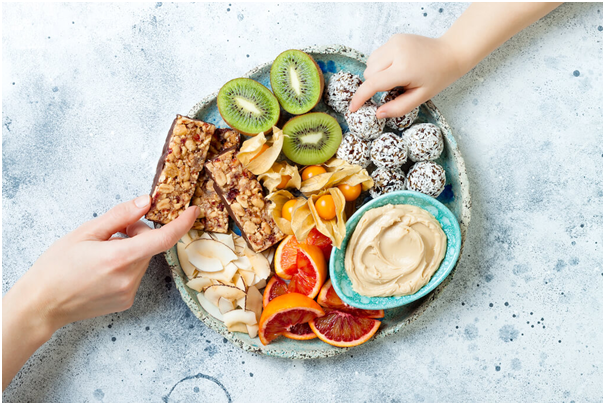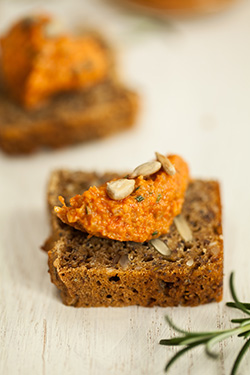Need ideas for snacking? Or maybe you feel you snack too often or not the right foods to keep your energy throughout the day. This month’s blog may help with these things, hope you find it useful.

A snack is generally defined as any food that is eaten between meals. It is estimated that people in the UK consume 21 snacks per week, a total of 1,095 a year. Some of the most popular snacks in Britain include crisps, biscuits, toast, chocolate, and fruit. Research has found that there are several reasons as to why we snack: hunger, boredom, social interaction, food cultures, self-indulgence. Some studies have found that snacking when not prompted by hunger, especially when motivated by emotions, was linked to a higher consumption of energy-dense snacks and a higher overall calorie intake (Barnes et al., 2015).
A study commissioned by Love Fresh Berries found that 39% of participants admitted to snacking more since COVID lockdown measures were introduced. This was attributed to spending more time at home, eating when bored/ not having much to do and eating a favourite snack relieved stress.
Are Snacks Good or Bad for You?
Many studies have investigated the benefits from snacking; however, findings have been inconsistent. This is thought to be due to the subjectivity when defining a snack. Nevertheless, the positive and negative effects of snacking on health have been associated with nutritional content of the foodstuff.
Benefits of Snacking
Simply, snacking can provide extra nutrients and a boost of energy. If several hours pass between meals and the blood glucose level drops this can cause feelings of fatigue and effect your daily tasks and productivity.
Consumption of healthy snacks containing fruits and vegetables has been associated with an enhanced diet quality and weight loss. A study that analysed workplace snacking habits of 233 adults concluded that individuals who snacked on vegetables lost weight during the experiment (Barnes et al., 2015). Furthermore, snacking can help curb your appetite which can prevent overeating at the next meal and thus, aiding with weight management.
Another positive to snacking is that it can help maintain adequate nutrition for people who have a poor appetite and cannot eat entire meals, such as due to illness. Furthermore, snacking can boost overall calorie intake which can aid in weight gain for individuals who are underweight or wish to gain weight for aesthetic reasons.
Drawbacks of Snacking
Most snacks are highly processed foods that are high in fat, sugar, and salt. A drawback from snacking is that it can lead to unwanted weight gain if the proportions or frequency of snacking is too much. Eating unhealthy snacks which are calorie-dense contributes to overall energy consumption; if the amount of energy consumed is greater than the energy used/burnt by the body over a long period of time this can lead to obesity. Snacking behaviour has been linked to weight gain and obesity; Barnes et al concluded that those who snacked on desserts and sweets had a higher Body Mass Index (BMI) (Barnes et al., 2015).
Another drawback from snacking is that it can lead to a reduced hunger at mealtimes, potentially resulting in meals being skipped entirely. Skipping meals or eating reduced amounts increases the risk of losing out on important nutrients. Filling up on an unhealthy energy-dense snack could mean that nutrient-dense foods such as vegetables are neglected.
Overall, it is important to be aware of what you are snacking on; aiming to eat healthy snacks in appropriate proportions to subside hunger and boost energy without consuming excess calories.
How to snack
It is important to plan your snacks; following these simple steps could help alleviate hunger, avoid dips in energy, reduce risk of over-eating and boost overall nutrient content of your diet:
- WHEN: Reflect on a typical day: when do you tend to feel hungry or reach for a snack?
- WHY: If you find yourself snacking a lot, determine if this is because you are hungry or eating because of an emotion.
- WHAT: Decide which snack choice will satiate you. It is important to pause before making a snack choice to consider what will truly satisfy you to avoid overeating. To achieve this, it could be helpful to think about what texture and flavour you are truly craving (crunchy, creamy, salty, savoury, or sweet). If you don’t have a specific craving, choose a healthy snack that is high in fibre and water that will fill your stomach quickly.
- HOW MUCH: A snack portion should be enough to satisfy but not so much that it interferes with your appetite for a meal or adds too many calories. A general rule of thumb is to aim for about 150-250 calories per snack.
A Snack Recipe Idea
Gluten Free Bread
Snack Ideas
Yummy high protein snack recipes
“As an Amazon Associate, I earn from qualifying purchases.”

